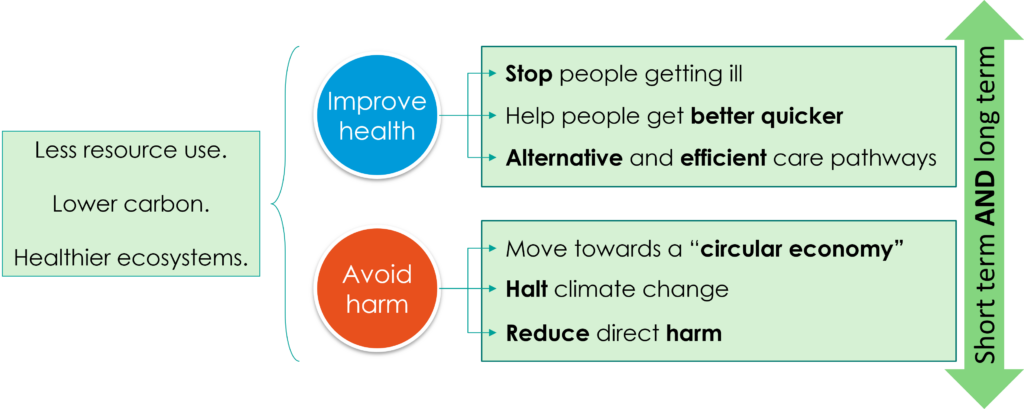Environmental Sustainability Healthcare Resources for NHS staff and partners
Do you work in the health and care system in BLMK and want to do more to improve health, care quality, efficiency, finances AND the environment? These pages and the buttons above will give you information on understanding the link between environment and health, and what you can do about it at work and in your personal life.
***Following the launch of the new BLMK Green Plan 2025-2032, these pages are undergoing a refresh – some links may not yet work, and content will be updated soon***
Sustainable Healthcare can help us to deliver good quality and financially viable services.
A lower-carbon system that respects the environment actively contributes to quicker, more efficient, better care.
By being more sustainable, we can support our other priorities to live longer healthier lives and reduce inequalities.
For more information about sustainable healthcare, click here or use the buttons above to navigate the site.

As a member of staff in the NHS or a partner organisation, you can work towards more-sustainable health and care by focusing on different aspects of the system. Expand the below sections for steps you can take.
1. Understand the system
- Before you begin, it is important to know which parts of the health and care processes you work with are not as environmentally sustainable as you would like.
- Use data to understand where energy is being overused, items are being wasted, or unnecessary journeys are taking place.
- Carbon calculators can help but the NHS does not recommend any specific carbon calculator. The GreenerNHS programme has produced a methodology for NHS staff (login required) outlining how to calculate carbon footprints, and which carbon factors to use.
- Map out any processes to work out why they are not environmentally sustainable.
2. Work with the key people involved, including patients and residents
- Everyone brings a different perspective and ideas, and means you’re more likely to consider all the unintended consequences of a proposed change.
- Dedicate time to work through the project – change can be quick, but don’t be disillusioned if your first idea doesn’t work.
- Use different approaches to get comments from people – notice boards for ideas, surveys, focus groups etc.
3. Work through the checklist of BLMK priorities
- Anaesthetic gases – eliminate those with the highest global warming potential; reduce nitrous oxide waste
- Apply the Green Theatre checklist
- Reduce the inappropriate use and waste of plastic gloves
- Use digital technology to reduce unnecessary journeys for staff and patients
- Implement anti-idling campaigns and support the use of active travel and public transport to reduce emissions and air pollution
- Help staff to understand more – encourage them to undertake a free e-learning course (login required) and set up “Green Groups”
- Embed sustainability in business processes – make sure all decisions consider the impact on the environment, and measure and report on progress
4. Put some fresh ideas together and try them out
You can use the categories in the image to guide you as you produce ideas.
Select first those ideas you think will have the biggest impact for the smallest amount of effort possible.
Remember to measure the impact of any ideas you test out.
Some issues you identify may not have solutions readily available – BLMK ICB is working with Health Innovation East to identify innovations.
If you need inspiration, visit the GreenerNHS webpages and FutureNHS GreenerNHS microsite (login required; NHS employees only).

A health impact assessment was published in January 2023, setting out the opportunities to improve health through the Green Plan.
For more information on what the NHS is doing to reach net zero, please visit www.england.nhs.uk/greenernhs

